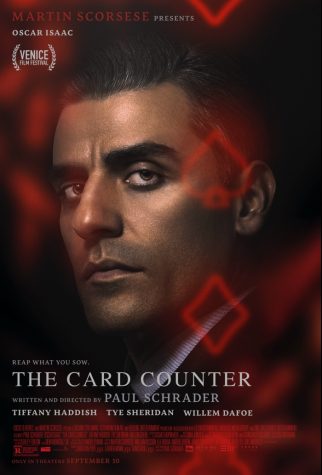‘The Card Counter’: Cinema’s Newest Bad Beat

https://www.focusfeatures.com/the-card-counter/watch/synopsis/
Minimal marketing combined with the duality of glowing reviews from critics and negative reviews from audience members sets the stage for “The Card Counter” as an ultimately lackluster and confusing film despite the big names associated with it. The drama, which opened in theatres Sept. 10, saw the return of the iconic duo Paul Schrader and Martin Scorsese, known for their work on films such as “Taxi Driver” and “Raging Bull.” While their history of producing cult classic success stories led to high expectations, this recent collaboration left much to be desired in almost every aspect, even with leading actors such as Oscar Isaac and Tiffany Haddish at the mantel. At the root of its many problems, the film was nothing more than a pretentious drama with an outdated script, disappointing visuals, and little to no rhyme or reason.
The film centers on Oscar Isaac’s title character William Tell, a man haunted by his past and unsure of his future with a gambling pseudonym that matches his mysterious and guarded identity. With a voice-over narration that carries throughout the entirety of the movie, except for the singular unfitting moment where Tiffany Haddish takes over, it’s revealed that Tell learned to count cards in prison, though the severity of his crimes aren’t fully revealed until later on. There’s a certain intensity that Isaac brings to every movie, best shown by his roles in “Ex Machina” and “A Most Violent Year,” and while he’s proven that even with the worst of scripts his performances are still a glimmer of cinematic talent and magnetism, even he couldn’t salvage the stagnant dialogue and seemingly forced interactions. There was little to no development possible in the two-dimensional character given, and it seemed the only choice he could make without butchering the interactions with costars Tiffany Haddish and Tye Sheridan even more, was to merely grimace for the agonizing 109 minute runtime. While his commitment to the character is admirable, there was no chance for a truly standout performance. Every moment was predictable and every conversation was stilted, making it one of Isaac’s weaker roles.
As for Tiffany Haddish, her role as La Linda is the only sign of warmth throughout the film. While this allows the audience a brief reprieve from the questionable seriousness the film holds itself to, it also creates an odd contrast that doesn’t always hold up. Her and Isaac had enough chemistry to pull off their scenes, especially when Tell finally goes to her hotel room, but not quite enough to make the awkward dialogue and cringe-worthy direction any more bearable.
It’s obvious why Haddish is drawn more to comedy rather than the drama she found herself in based on the attempted light humor her character conveys, and while she definitely has the potential to further future drama roles, this might not have been the right project to start off with.
The real weak link amongst the various performances was Tye Sheridan’s role as Cirk. While Isaac had a certain screen presence that made his scenes worth watching, and Haddish was a surprising but nice addition to the intensity of the characters, Sheridan’s performance was the equivalent of cinematic white bread. Even the singular fat Asian character who was merely a five minute prop piece to act as the butt of the subtly racist jokes was more interesting and satisfying then Sheridan’s character, though it’s unclear if it was another misfire on behalf of the script or truly bad acting. Predictability was the key motivation behind each of his actions, and not even Isaac’s addition to their interactions could save them. His ending was a breath of relief for the audience, and while there may be hope for his future roles after this, it seemingly faded with the film.
The script seemed to be the real villain of the movie. The dialogue was predictable and incredibly detached despite the supposed “meaningful” moments between characters, and while it fit the tones of isolation and solemnity, it made the audience grimace almost as much as Oscar Isaac. There was no satisfying climax to the dragged out plot and none of the jokes really landed. The humor itself was an appalling addition that would have been better left in the 1970s. The amount of sly comments and jokes at the expense of Asian Americans was baffling for a movie made and set in the present day, with comments that were glossed over as quickly as they were made. The script was a pretentious relic from an older era, written to be serious and intense but only succeeding in being laughable and confusing.
The camera work and creative choices only added another layer of questionability to the experience. Many of the scenes, especially those that were meant to capture interactions between characters, were shot from either an odd angle and distance, or with a lense far too wide for the purposes of the dialogue, making the audience feel wildly disconnected from the subject matter. The camera also chose to focus on the bare and desolate settings the characters inhabited rather than the characters themselves, creating an odd focus that drew away from the interactions happening, and instead caused the audience to realize how weirdly constructed everything was. The film seemed stretched between multiple genres, with a plotline best suited for a crime drama, yet a voice-over and flashbacks more characteristic of film noirs. While the two genres could definitely coincide, they instead created an even more disjointed film that didn’t seem to know what it was doing. The cinematography didn’t help either, with a blandness characterized by the film and a lack of any visual appeal or fluidity. Even with these flaws, the lack of energy was the true inhibitor of the film, creating a dull, lifeless void of a movie that held no real semblance of meaning or heart that could have redeemed it.
While the film had the classic elements one would expect from a Schrader film, and the variables one would expect from a box office hit, it ultimately missed the mark on nearly every point from a viewer’s perspective. The audience reviews are a more accurate reflection on the impact of the film while the critics may have appreciated it as the pretentious indie flick it aimed to be. With so much wrong jammed into one film, its only accomplishment was becoming a worrying statement on the future of Schrader and Scorsese’s collaborations.







